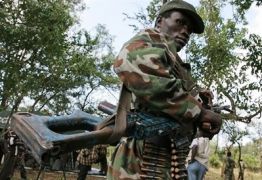Ugandan rebels kill two people in fresh Sudan’s Equatoria attack
September 18, 2008 (SAKURE) — Ugandan rebels early this morning attacked a border village of Sakure sub-county (payam) between Sudan and the Democratic Republic of Congo (DRC) in a surprise attack on the Sudan People’s Liberation Army barracks.

“About one hundred LRA rebels made a surprise attack Thursday morning on the SPLA military barracks in Sakure Payam,” said state Minister of Information and Communications Col. Joseph Ngere, speaking to the press after getting reports from a team that the Western Equatoria State government dispatched to the area the morning of Sept. 18. “One SPLA soldier was killed and a 4-year-old child was killed too.”
LRA are reported to have abducted and mutilated some inhabitants and four persons are reported wounded.
Sakure is about 30 km (19 miles) from Yambio and 42 km (26 miles) from Nzara county seat, under which Sakure is a payam. The area is far to the northwest of Uganda.
Ngere further explained that the child “was thrown live into the fire flames of the burnt house of the area’s chief, which is just three kilometers from SPLA military barracks at the Sudan-DRC international borders. Neighboring households next to the chiefs were also burnt down by the fugitive LRA bandits, leaving the area dilapidated.”
However, Ngere said, “LRA rebels were quickly repulsed by the SPLA forces. On the roads where the LRA escaped, there were drops of blood. … SPLA forces captured one rifle from LRA rebels.”
The attack was unexpected, given reports that LRA have pledged to sign a deal this weekend. Ngere concluded, ” there is no reason for negotiation and wasting of resources for the LRA dead-locked peace deal.” Higher-level elements in the government of South Sudan, though, continue to engage LRA for a peace settlement, including South Sudan’s Vice President Riek Machar, the chief mediator of the LRA-Ugandan government peace negotiations.
Unconfirmed reports from Juba indicate that the Sudanese delegation, headed by chief mediator Riek Machar, will head to Nabanga on Sept. 19 to sign a final deal with LRA.
Machar has made several visits to Nabanga without informing the state government, according to sources close to the governor’s office. This lack of communication caused Western Equatoria Governor Jemma Nunu Kumba to urge mediators to keep the state informed on the schedule of the talks and the final arrangements of the peace deal.
Kumba complained that thus far the state depends on radio to hear news about LRA peace talks, even though the area has hosted LRA fighters since 2006, when mediators earmarked Western Equatoria to host them, an arrangement which many citizens opposed.
“There is now a clear indication that LRA rebels are not of any seriousness to make a final peace,” she added. Similarly, Ngere told reporters that “despite the peaceful approach spearheaded by government of South Sudan (GoSS), the Western Equatoria government will defend itself and its citizens effectively, should great havoc continue.” SPLA reinforcements to Sakure are on their way.
LRA attacks since early 2006 in Western Equatoria have left fear and hunger in the region, and many citizens wonder whether the GoSS government is serious about security. Despite the government’s recent move to send more soldiers to the region, many feel that GoSS is deaf to their plight and plea for peace.
This is the second major attack by the LRA rebels since the Juba peace talks faltered. Joseph Kony, the leader of the LRA, at one point refused to sign a deal that had been agreed upon, and has since asked for some modifications to the peace deal.
Kony, who is sought by the International Criminal Court for war crimes, became a traditional healer in an Acholi village as a young man. When the current government came to power in 1986 and began a crackdown in Acholiland, Kony emerged as the leader of the Lord’s Resistance Army resistance movement.
LRA’s stated objective was to run Uganda in accordance with the Ten Commandments, but the movement committed horrendous atrocities and practiced mass kidnapping, training children as soldiers.
Since receiving weaponry and support from Khartoum in the mid-1990s, Kony’s rhetoric expanded to include adherence to some aspects of Muslim doctrine, prohibiting his followers from eating pork and demanding they observe Ramadan. He was also said to be a spirit medium, channeling the spirit of a former Ugandan minister and a Chinese general.
(ST)
